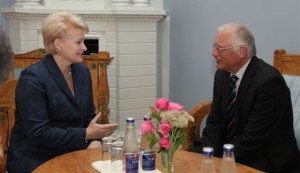
Günter Verheugen met with Lithuanian President Dalia Grybauskaitė at the Presidential Palace today before making his announcement about the country's economy.
VILNIUS — A European Commission vice president announced today that Lithuania’s economy bottomed out in the second quarter and has already started recovering.
European Commissioner for Enterprise and Industry Günter Verheugen said at a press conference with Lithuanian President Dalia Grybauskaitė that the country had “hit the ground already” and was turning around.
Lithuania’s gross domestic product fell by more than 20 percent last quarter, forcing a painful round of austerity measures on the once-prosperous Baltic Tiger.
Lithuania’s government agrees with Verheugen’s assessment.
“I think we have a number of indicators pointing precisely to that. Those indicators are production indicators, manufacturing indicators showing production has been increased,” Mykolas Majauskas, the Prime Minister’s economic adviser, told Baltic Reports. “I think it’s very likely we’ve reached the bottom of the cycle.”
Majauskas pointed to a trend among European economies that the crisis caused the GDP to fall to 2006 levels before recovery began and asserted that this was also happening in Lithuania.
“Well, the GDP has decreased, but we can see that we’re coming back,” Majauskas said. “If you look at Germany … they’re also going back to 2006, also Finland, also Estonia, also Latvia.”
Both the German and French economies, two of Europe’s largest, returned to growth in the second quarter with 0.3 percent GDP gains each.
Mixed bag
Reaction to Verheugen’s announcement among economists was mixed.
Gitanas Nausėda, an economist for SEB Bankas in Lithuania agreed that the bottom was likely reached in the second quarter of this year.
“Yes, I agree with this point of view because we also forecast that the largest subtraction was reached in the second quarter. The third and fourth quarter will be better but the subtraction will remain,” Nausėda told Baltic Reports.
However Nausėda cautioned that Lithuania’s economic recovery may not come until next year.
“The tension in fiscal policy, the tension in labor market will continue,” Nausėda said, noting the country’s recent tax hikes and unemployment increases. “The turning point will be reached at the end of next year or the beginning of next year.”
Others were more skeptical of Verheugen’s statements. Timothy Ash, the head of Central and Eastern European market research at the Royal Bank of Scotland, said determining the second as the downturn’s bottom is premature.
“I think it’s a bit too early to tell,” Ash told Baltic Reports. “There are very clear fundamental problems with the economy and the global situation is unclear.”












